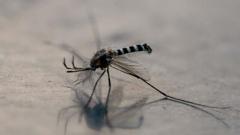Kennedy's decision to sack all members of the committee that recommends vaccinations has sparked criticism from health experts and concerns about a potential bias in future appointments, as he seeks to rebuild public trust in vaccines.
RFK Jr. Dissolves Vaccine Advisory Committee Amid Controversy

RFK Jr. Dissolves Vaccine Advisory Committee Amid Controversy
Health Secretary Robert F. Kennedy Jr. dismisses the entire Advisory Committee on Immunization Practices, citing conflicts of interest.
US Health and Human Services Secretary Robert F. Kennedy Jr. has taken the unprecedented step of dismissing all 17 members of the Advisory Committee on Immunization Practices (ACIP), a body responsible for government vaccination recommendations. In an editorial published in the Wall Street Journal, Kennedy expressed that the committee's existing conflicts of interest were damaging public confidence in vaccines.
Kennedy, who has long been critical of vaccine safety and efficacy, stated that he aims to ensure that the American public receives the "safest vaccines possible." However, his critics, including many doctors and health experts, have voiced concern over his stance on vaccines, pointing out that public health should be guided by science.
On Monday, Kennedy announced the retirement of the ACIP members, many of whom were appointed during the final days of President Biden's administration. Kennedy argued that retaining these members would limit President Trump’s ability to appoint a majority by 2028. He further criticized the committee for being viewed as a “rubber stamp” for vaccines, alleging that there were serious conflicts of interest among committee members, who often receive funding from pharmaceutical companies.
Kennedy’s actions run counter to assurances he had previously provided during his Senate confirmation hearing, where he promised to maintain the integrity of the committee. Republican Senator Bill Cassidy, who is also a physician, expressed his disappointment at the drastic changes, worrying that the new appointments may lean toward individuals who lack adequate vaccine expertise.
ACIP members are required to disclose potential conflicts of interest, and although they are expected to recuse themselves from votes in such cases, Kennedy emphasized a systemic issue rather than individual corruption. He noted that the existing paradigm of industry ties could adversely affect the overall mission of the committee—a sentiment that has alarmed numerous public health officials.
Dr. Bruce Scott, president of the American Medical Association, condemned the dissolution as a dangerous move that disrupts a transparent and historically effective process in vaccination recommendations. He warned that this disruption could exacerbate the ongoing decline in routine childhood vaccination rates and potentially lead to outbreaks of vaccine-preventable diseases.
As of now, Kennedy has not announced any replacements for the ousted ACIP members. The committee has a crucial meeting scheduled for June 25, where it is set to discuss vaccine recommendations for several diseases, including COVID-19, influenza, and RSV. The public health implications of Kennedy's decisions continue to loom large as experts weigh in on the future direction of vaccine policy in the United States.




















